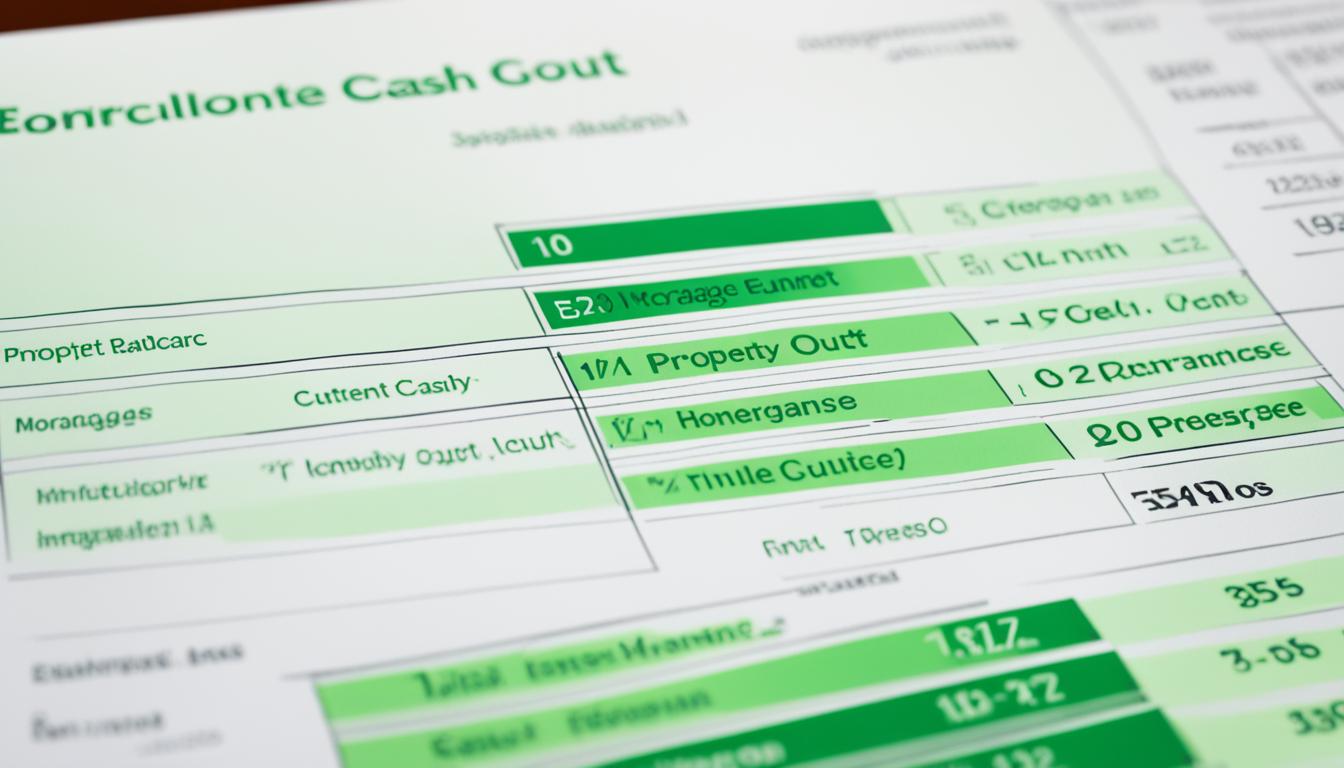Cash Out Mortgage Refinance Calculator for Accurate Estimation of Your Refinancing Options
A cash-out refinance lets homeowners borrow cash with lower interest rates. It replaces your current mortgage with a new one. This new mortgage includes the cash loaned from your home’s equity. And it also covers the home’s value.
To figure out your new mortgage’s monthly cost, you can try a cash-out refinance calculator. You’ll need to enter details like your home’s value, how much you still owe on the mortgage, and your credit score. Also, add how much cash you want to take out, the loan term, and what you think the interest rate will be. Don’t forget to include property taxes, insurance, and HOA fees for a better estimate. Checking offers from different lenders can help you get the best deal.
Key Takeaways:
- A cash-out refinance lets homeowners borrow cash at lower rates by using their home equity.
- It allows for more funds and the chance to lower monthly mortgage payments by getting a new mortgage.
- With a cash-out refinance calculator, you can see what your monthly payments might be by putting in different factors.
- Shopping around and comparing cash-out refinance deals can help you find the best rates and terms.
- For homeowners wanting to know their choices, cash-out refinance calculators are very useful.
Understanding Cash-Out Refinance Costs
When you look into a cash-out refinance, you need to know about the costs. These costs cover things like the application, appraisal, and flood check fees. You also have to consider origination fees, title search costs, and premiums for title insurance. Closing costs for this type of refinance usually fall between 2% and 6% of the loan amount.
You might pay these expenses immediately or use part of the cash-out for it. Some lenders might also have no-closing-cost refinance deals. In these cases, they pay the costs if you agree to a higher interest rate or adjust your loan value.
But, keep in mind, a cash-out refinance ties your house to the deal. It’s vital you find a way to pay on time to avoid losing your home.

Understanding Cash-Out Refinance Costs
“A cash-out refinance allows homeowners to borrow cash at lower interest rates than other forms of credit.”
– [Lender Name]
Doing your homework on cash-out refinance costs is key. Fees for appraisals, application processes, flood checks, and more add up quickly. Considering these costs when weighing the pros and cons of a cash-out refinance is a must.
On average, closing costs are between 2% and 6% of your loan. For a $200,000 loan, closing might cost you $4,000 to $12,000. Make sure to include these costs in your budget and check if the benefits outweigh them.
How you pay is up to you. You can pay at closing, use the cash-out, or opt for a no-closing-cost refinance. But be wary. Such a deal could lead to higher interest or a bigger loan. Consider what works best for your financial health.
Protecting your home and financial future is crucial. Think hard before signing up for a cash-out refinance. If you can’t make the payments, you might lose your home. Make sure you’re financially ready before you refinance.
Maximizing Your Cash-Out Refinance Benefits
A cash-out refinance can improve your finances and help you reach your goals. It lowers your mortgage payment by refinancing with a lower rate. You can figure out your potential savings using a cash-out refinance calculator.
This type of refinance also gives you extra money for many things. You could fund home upgrades, pay off debts, or cover big costs. This way, you avoid more loans or using high-cost credit cards by using your home’s equity.
When looking at how much equity you can tap into, focus on the loan-to-value ratio. For cash-out refinances, FHA and conventional loans allow up to 80% LTV. VA loans might permit up to 90%. This can let you borrow a good amount based on your home’s worth.
To understand how much cash you can get without straining your budget, try a cash-out refinance affordability calculator. Just enter your home’s value, current loan balance, and other details. It will show you a safe equity amount to access.
For the best cash-out refinance results, think carefully about your financial needs and goals. Talking to a financial or mortgage expert is very helpful. They can offer advice that fits your situation. With their help, you can make the most of your home’s value and enhance your financial health.
Cash-Out Refinance vs. Other Home Equity Options
A cash-out refinance isn’t your only choice for using your home equity. You can also consider a Home Equity Line of Credit (HELOC) or a home equity loan. They let you access your equity without changing your current mortgage.
A HELOC is like a credit card, giving you a line of credit that you can keep using. Home equity loans, on the other hand, provide a one-time amount. You should pick the best option by looking at things like interest rates and how you pay it back.
“While a cash-out refinance is a popular choice for accessing home equity, it’s essential to explore all available options to make an informed decision.”
A cash-out refinance calculator can show you the costs of different equity options. It helps you see the pros and cons of each, based on what you can afford and your needs.
Benefits of Using a Mortgage Refi Cash Out Calculator
- Accurate estimation of costs involved in a cash-out refinance
- Ability to compare various home equity choices
- Assists in making choices that suit your financial status
Using a cash-out refinance calculator offers clear insights into your home equity options. It helps you decide how to move forward with your financial plans efficiently.

Conclusion
A cash-out refinance calculator is key for homeowners. It helps them use their home’s equity wisely. By checking monthly payments and comparing offers, you can choose what’s best for you.
It’s important to look at all the costs and other options before deciding. This ensures it’s the right choice for you.
Also, remember a refinance calculator can make things easier. It’s great for getting money for home upgrades, paying off debt, or big costs.
Take time to think about your choices and how they fit your budget. With this tool, you can plan well. This will help you get the most from your home and your money.




